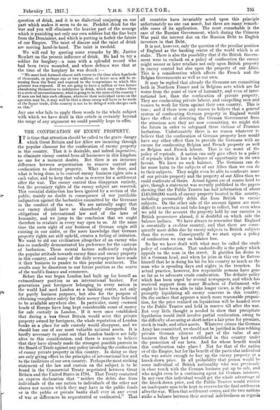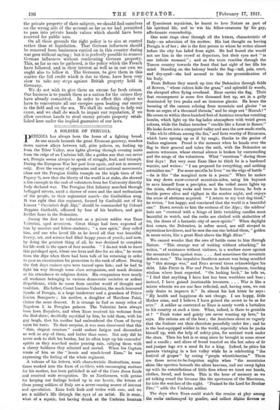THE CONFISCATION OF ENEMY PROPERTY.
IT is time that attention should be called to the grave danger which Great Britain and her Allies are incurring through the popular clamour for the confiscation of enemy property in this country. That it is desirable, and indeed imperative, to eliminate enemy control from all businesses in this kingdom no one for a moment doubts. But there is an immense difference between sequestration to remove control and confiscation to destroy property. What can be done, and what is being done, is to convert enemy business rights into a cash value, and to keep that value in re serve for a settlement after the war. The enemy control thus disappears entirely, but the pecuniary rights of the enemy subject are reserved. This essential distinction has been ignored by a section of the public, mainly no doubt in consequence of our justifiable indignation against the barbarities committed by the Germans in the conduct of the war. We are naturally angry that our enemy should have so shamelessly disregarded the obligations of international law and of the laws of humanity, and we jump to the conclusion that we ought therefore to retaliate in every way open to us. At the same time the mere sight of any business of German origin still existing .in our midst, or the mere knowledge that German property rights are still upheld, creates a feeling of irritation. We want to, rid our civilization altogether of an enemy who has so markedly demonstrated his preference for the customs of barbarism. These mental factors sufficiently explain the popular attitude towards enemy firms and enemy property in this country, and many of the daily newspapers have made it their business to pander to this popular sentiment. The results may be disastrous to our future position as the centre of the world's finance and commerce.
Before the war began London had built up for herself an extraordinary position as an international banker. For generations past foreigners belonging to every nation in he world had used London as a banking centre, not only for purely business purposes, but also for the purpose of obtaining completer safety for their money than they believed to be available anywhere else. In particular, many crowned heads of Europe have long kept considerable sums of money for safe custody in London. If it were once established that during a war Great Britain would seize this private property owned by foreigners, the whole reputation of London banks as a place for safe custody would disappear, and we should lose one of our most valuable national assets. It is -hardly necessary to point out that London bankers are fully alive to this consideration, and there is reason to believe that they have already made the strongest possible protests to the Board of Trade againstany policy involving the confiscation of enemy private property in this country. In doing so they are only giving effect to the principles of international law and to the traditions of our own country. Perhaps the most striking statement of the law and custom on the subject is to be found in the Commercial Treaty negotiated between Great Britain and the United States in 1794. That Treaty contained an express declaration that " neither the debts due from individuals of the one nation to individuals of the other nor shares nor monies which they. may have in the public funds P°' or in the public or private y banks shall ever in any event of war or differences be sequestrated or confiscated." That all countries have invariably acted upon this principle unfortunately no one can assert, but there are many remark- able cases of its application. The most remarkable is the case of the Russian Government, which during the Crimean War paid the interest due on the Russian Debt to English investors in that Debt.
It is not, however, only the question of the peculiar position of England as the banking centre of the world which is at stake. There is also the possibility that if the British Govern- ment were to embark on a policy of confiscation the enemy might sooner or later retaliate not only upon British property in enemy control but also upon the property of our Allies. This is a consideration which affects the French and the Belgian Governments as well as our own.
It may be replied that already the Germans are committing both in Northern France and in Belgium acts which are far worse from the point of view of humanity, and even of inter- national law, than the confiscation of private property. They are confiscating private labour, and compelling men and women to work for them against their own country. This is true ; and if there were any reason to believe that a general system of confiscating German property in England would have the effect of deterring the German Government from the atrocious acts they are now committing, we might risk the future in order to safeguard these victims of Prussian barbarism. Unfortunately there is no reason whatever to believe that the confiscation of German property here would have any other effect than to provide the Germans with an excuse for confiscating Belgian and French property as well as Belgian and French labour. That is the worst of the policy of reprisals. A nation can only give effect to a policy of reprisals when it has a balance of opportunity in its own favour. We have no such balance. The Germans can do far more harm to the subjects of our Allies than we can do to their subjects. They might even be able to confiscate more of our private property and the property of our Allies than we could confiscate of theirs. Actual figures are of course hard to give, though a statement was recently published in the papers showing that the Public Trustee has had information of about £140,000,000 worth of enemy property located in this country, including presumably debts duo from British to enemy subjects. On the other side of the account figures arc more difficult to ascertain and take longer to collect, but even when we add to the account the property held by our enemies in British possessions abroad, it is doubtful on which side the balance inclines. We have always to remember that England is essentially a creditor country, and that there arc conse- quently more debts due by enemy subjects to British subjects than the reverse. Consequently if we start upon a policy of confiscation we may on balance lose.
So far we have dealt with what may be called the crude policy of confiscation. That undoubtedly is the policy which appeals to the man in the street. It gratifies his desire to hit a German head, and when he joins in this cry he flatters himself that he is doing his bit for his country as much as the man who is spending days and nights in the trenches. In actual practice, however, few responsible persons have gone so far as to advocate crude confiscation. The definite policy which has been urged by several newspapers, and which has received support from many Members of Parliament who ought to have been able to take longer views, is the policy of promptly liquidating all enemy concerns in this country. On the, surface that appears a much more reasonable proposi- tion, for the price realized on liquidation will be handed over to the Public Trustee and held in reserve till after the war. But very little thought is needed to show that precipitate liquidation would itself involve partial confiscation, owing to the difficulty of securing at short notice a fair price for premises, stock in trade, and other assets. Whatever crimes the German Army has committed, we should not be justified in thus robbing private German citizens of part of the value of any business that they had established in this country under the protection of our laws. And for whose benefit would this confiscation take place ? Not for that of the nation or of the Empire, but for the benefit of the particular individual who was astute enough to buy up the enemy property at a knock-down price. In all probability that person would be some individual of British nationality who was previously in close touch with the German business put up to sale, and who might even be a continuing agent for German interests. In any case this individual would get the whole advantage. of the knock-down price, and the Public Trustee would receive an inadequate sum to be kept in reserve for the final settlement after the war. When that settlement comes, and the two nations strike a balance between their mutual indebtedness as regards the private property of their subjects, we should find. ourselves on the wrong side of the account so far as we had permitted to pass into private hands values which should have been reserved for public uses. On all these grounds the right policy is to aim at control rather than at liquidation. That German influences should be removed from businesses carried on in this country during war goes without saying ; but it is perfectly possible to remove German influences without confiscating German property. This, as far as can be gathered, is the policy which the French have followed, and in their interest as well as in our own we ought also to follow it. The Germans, to give them in this matter the full credit which is due to them, have been very slow to take any steps against British property held in Germany.
We do not wish to give them an excuse for fresh crimes. Our business is to punish them as a nation for the crimes they have already committed. In order to effect this object we have to concentrate all our energies upon beating our enemy in the field and on the sea. We shall do nothing to help our cause, and we shall do much to impair our reputation, if we allow covetous hands to steal enemy private property estab- lished here under the implied guarantee of our laws.



































 Previous page
Previous page